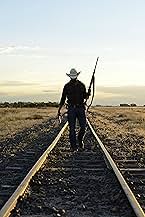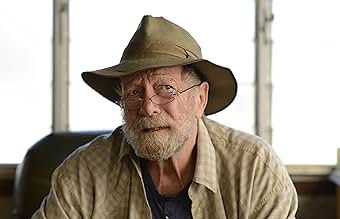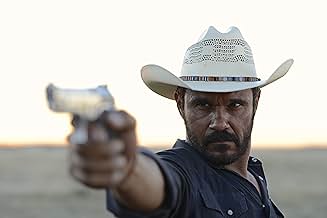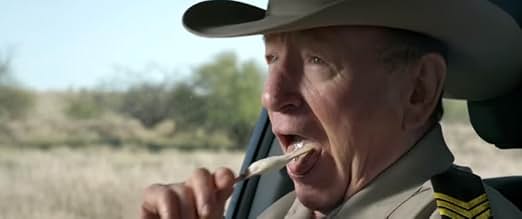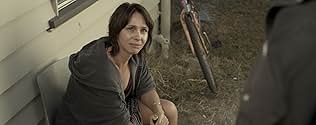An indigenous detective returns to the Outback to investigate the murder of a young girl.An indigenous detective returns to the Outback to investigate the murder of a young girl.An indigenous detective returns to the Outback to investigate the murder of a young girl.
- Awards
- 9 wins & 16 nominations total
- Director
- Writer
- All cast & crew
- Production, box office & more at IMDbPro
Featured reviews
The first scene sets up the whole film most deftly: its depiction of the magnitude of the land at sunset coupled with the place name, Massacre Creek, instantly makes it clear that the vastness of the Australian terrain and inglorious, largely unrepented historic events will frame what follows.
Aaron Pedersen plays the police detective Jay Swan, an Aboriginal returning from 'the city' to his small and extremely isolated home town after a 10 year absence. He is estranged from his former wife, now an alcoholic making a hash of raising their daughter, and also the community in which he was raised. Not fully accepted by the white community either, he is the classic outsider forced to go it alone.
Swan is assigned to the case of a murdered Aboriginal teenage girl whose body is found in a state of some decay quite some time after her violent end. It probably won't come as a great shock to find that the rest of the local constabulary, all white and male, are not only indifferent to the crime but hostile to its investigation, impeding Swan at every juncture. As Swan battles on uncovering corruption, drug dealing and civic sanctioned child prostitution, he starts to shed light on the town's inherent racism and misogyny – there appears to be no one in the town of any authority who is either black or female.
The film is a modern twist on the western genre: the lone lawman coming to town quietly determined to see right is done. It is the sort of role Gary Cooper, John Wayne and Jimmy Stewart all handled with ease 60 years ago. Aaron Pedersen is a worthy successor to these Hollywood greats, compelling in his restrained performance, giving just a hint of the angst beneath his calm exterior but always in control of himself. In the main, the supporting cast is also strong – especially Hugo Weaving as a police officer of dubious integrity and an alluded to murky past.
Like all classic westerns the film's denouement is a good old-fashioned shoot-out. This extended scene is particularly well handled by Sen with tight direction and camera work – although his cinematography throughout the film is praiseworthy.
The film has a few flaws. Early scene dialogue giving the backstory is rather stilted – though this quickly settled down; the minor character of a buffoonish local newspaper reporter was both unconvincing and irrelevant – it was as if Sen felt, wrongly, that his film needed a little comic relief. And I was surprised at the amount of drugs uncovered in such a very small town. I'm no expert but I'd have thought the quantity shown would be enough to supply the whole of Melbourne – including its nearby rock festivals – for a year.
Ultimately, many of the film's plot strands were left hanging which was, ostensibly, rather untidy. But on this, I'm giving Ivan Sen the benefit of the doubt. There was no neat resolution to his film or the crimes it depicts, because there is, as yet, no resolution to the social issues he raised in a non-preachy manner.
A couple of things in particular make this film really successful. Firstly, it has a compelling and deliberately developed mystery plot-line that slowly reveals its secrets; secondly, its Queensland outback location is wonderfully used to add atmosphere and depth. The Australian outback is really a very cinematic landscape, its sheer expanse and seeming endlessness can look great in a widescreen frame and the cinematography in Mystery Road shows again why. The shots of the landscape are often very beautiful. This contrasts quite jarringly with the small country town, which is entirely functional, with no beauty. We really feel the heat as well. This leads to a slowed down pace and a laid-back feel, very much in keeping with Australian life in general. This extends to the slow and deliberate way that the story-line unfolds before us.
The film looks at a few social issues that underpin the mystery story-line such as race relations, prostitution, police corruption and drug abuse. By the end, it would only be fair to say that all of the questions posed by the mystery have not been neatly answered. If anything, this works in the film's favour though as it makes you ponder events even more afterwards. What also helps is that the acting by the entire cast is very good. From the smallest support roles to the lead actors, everyone is excellent. Aaron Pederson in the lead role is particularly impressive. His measured and quiet persona is just the right tone and in keeping with the overall authenticity of proceedings. This is a film almost solely concerned with mystery mechanics at the expense of thriller elements. This, however, changes at the end where we are treated to one of the best shootouts you will see in any film. In keeping with the rest of the movie, this is a gun fight that retains its realism. It's because of this it's so interesting. It's messy and far removed from typical action movie shootouts; consequently it's far more effective. Of especial note are the long distance duels, where the delay between shots are so unusual and add considerable tension. It's an inspired ending to a very good Australian film.
The movie narrates a story of a lonely detective who tries to hunt down the murderer of a young girl in the remote and sparsely inhabited territory of Australia. But the movie is intended to be real, and makes a great effort in order to achieve that. It tries to show us the everyday life of a lonesome ranger in a realistic way. Thus, it could give us a totally different picture than the Hollywood action-stuffed blockbusters can provide.
We can hardly see a single gun in use throughout the whole movie, but somehow it manages to attract the attention of the audience. The newer and newer details of the crime are revealed in a nicely right pace. Sometimes, during the interrogation of a person I've already known what the detective's following question would be. But not the teeming clichés are responsible for that (because there were any), but the adequate atmosphere what the movie could have created, because it's able to involve the audience and encourage them to investigate along with the protagonist.
At the beginning I felt the fact a bit weird, that almost every single member of the town were totally unfriendly with the detective, even a few years old tiny kid, who was brave enough to announce without batting an eyelid that he'd take the detective's life. But later I realized, that I wouldn't be really happy too, if a ranger wanted to ask me a few question about a murder. However, not only these people were raw to the protagonist, but the other policeman were pretty arrogant either. We can feel the tension in almost every moment of an interrogation, because the conversations are usually interrupted with awkward silence, because the detective could hardly pull out the valuable information out of the people. That's why the dialgoues are occasionally a bit silly, but there are some moments when they're quite funky and gripping.
Nevertheless, the actors did a fine job, as far as some of them had only little opportunity to prevail on the silver screen. I admit, that it wasn't Hugo Weaving's most outstanding performance, as we could see him acting far better in the Matrix or in The Lord of the Rings. But I couldn't blame him for that, because his character was really obnoxious in this movie. I could have accused him at his first appearance on the screen, like almost any other people in the movie, except the protagonist.
We can hardly hear any music or soundtrack throughout the movie (only one or two), but it simply draws benefits from that, because the movie could create a much more depressing atmosphere int hat way. The film could perfectly visualize in front of our eyes, that the detectives don't have as fast-paced life as we could experience that in the high- budget Hollywood movie, but they are much slower, tedious, tiresome and difficult. The film owns a nearly 2 hours long runtime, thanks to the fact in part, that it has taken up the conventional towed style of the western genre. There are some moment, when we could see the characters looking at each for a quite long time period without moving or saying a word. But it had to be like this! So no worries!
If You'd like to experience a life-like investigation in a realistically implemented environment in the company of a logically built up storyline, than I can bravely recommend You this movie! Buti f You wanna see some action scenes speeding by right after other, and You don't wanna get slowed down, then this movie will not be your cup of tea.
Thanks for spending your precious free time with reading my review! Hope you liked it!
So how did it get me? I guess because it struck me as believable - the characters, the places, the story. Having visited the edge of the Auz outback I fully related to the backgrounds and the characters. The texture and feel of the presentation struck me as the genuine article. I have said it before about top quality film directing - that the feel was more like a documentary with real people and not actors.
The acting was excellent but not of a fine silken quality or in any way slick. Rather the characters were raw and gritty, which could explain some review comments suggesting wooden or poor acting.
This movie felt like a fly on the wall view of the hard side of a tough life in the Australian outback, replete with huge social problems, racism, and defeated and depressed people tying to survive while drugs and crime were eating into the life of the area.
As depressing as was the setting, funny enough, I was not in the least depressed by the movie. There was a strong ethical line and I felt throughout that good would make it in the end.
This is a great movie without any big name actors, without fancy settings, without a great musical score, without great special effects, without bells or whistles of any description. It is totally minimalist art. It's greatness is in the excellent direction, the acting, the cinematography, and a decent enough plot.
The overall tone of Mystery Road is what sets it apart from other movies of similar type. From the camera shots all the way down to the dialogue, everything is depicted with realism. There is a real awkwardness to the conversations between characters in this movie, almost like you would see in real life. While obviously still scripted, the way Ivan Sen went about depicting these scenes made for a unique perspective. From cinematographic standpoint, this film is stunning. Utilizing both top down angles of the town and low-angled sunset shots, Sen really brought the outback to life quite beautifully. This film really reminds me of the Coen Brother's No Country for Old Men, both in tone and the way the scenes were shot. Also like No Country for Old Men, Mystery Road features a soundtrack nearly devoid of music. This adds a somber, gritty feel to the already stoic nature Mystery Road portrays.
The acting in this movie is pretty fantastic throughout. Some of the supporting characters weren't as convincing, but they played a rather minor role in the overall scheme of things. This movie focuses heavily on the main character, and rightfully so, as he's a total bad-ass. You can read the synopsis above so I won't waste time here. I must say, however, that Jay Swan(played by Aaron Pedersen) is pretty enjoyable to follow as he attempts to unravel the mystery of a dead girl in his hometown. Mystery Road shines a spotlight on race relations in Australia as well, and with Jay being an aboriginal detective, he faces a lot of adversity throughout the film. It is interesting to see this as an American, since we are not often exposed to such things that happen in Australia. There always seems to be a layer of tension below the courtesy between Jay and his fellow townsmen, either due to him being an aboriginal himself or because he is a detective.
Now to the negatives, which there are a few. First, this movie starts out quite slow. I almost gave up on it as I fell asleep twice in the first 40 minutes. Had it not been for the fantastic shots of the outback and a few intriguing individuals, I may not have made it through. Things begin to pick up around the halfway mark but this will most definitely turn some people off. There are also a few plot holes, but I won't give them away as they may ruin some of the ending. Many of the characters are sadly under-developed as well, which detracts from the overall intrigue of some very interesting individuals. While Hugo Weaving was quite good and his character interesting, he role was particularly undeveloped in my humble opinion. Instead, Sen decided to focus more on Jay, which is OK for the most part, but it would have been nice to see some other characters get more screen time.
Overall, this movie offers some fantastic shots of the rural outback of Australia with an interesting plot to boot. Things do start off slow but it also, quite literally, ends with a bang. This ending is not one to miss, and has one of the most impressive gun battles I have seen perhaps ever. If you are a fan of gritty mystery movies, definitely check out Mystery Road.
Did you know
- TriviaMuch of this film is shot in the small Australian town of Winton. Mystery Road held its first screening there. Some of iconic Australian film, Crocodile Dundee, was shot there (The Walkabout Creek Pub Scene).
- GoofsWhen the detective pulls up to Mary's house, she is watering the lawn with a hose. But when Mary calls Crystal to come out, she no longer has the hose and it isn't on the ground when the scene widens. When Crystal walks over to the detective's car, Mary once again has hose in hand, watering.
- Quotes
[first lines]
Detective Jay Swan: [waking to answer the phone] Yeah? Alright. OK...
[rolls out of bed]
Robbo: [greeting his arrival on scene] Jay...
Detective Jay Swan: G'day, Robbo. What's the story?
Robbo: The truckie pulled up to check his trailers, heard a wild dog growling from under the bridge, smelt something rotten.
Detective Jay Swan: How did he know it was a wild dog?
Robbo: Guess he just knows the difference, I suppose. You know, between a wild dog and a wild kind of normal dog.
- How long is Mystery Road?Powered by Alexa
Details
Box office
- Budget
- A$3,000,000 (estimated)
- Gross worldwide
- $280,702
Contribute to this page





